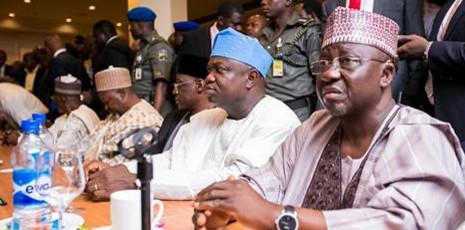 Abdul’aziz Yari, governor of Zamfara and chairman of the forum, said this while briefing reporters on the resolutions of the forum at its meeting in Abuja. He said the forum discussed the economy and resolved to look for means to enhance states’ internally generated revenues as well to cut overhead cost, especially the salaries of political office holders.
Abdul’aziz Yari, governor of Zamfara and chairman of the forum, said this while briefing reporters on the resolutions of the forum at its meeting in Abuja. He said the forum discussed the economy and resolved to look for means to enhance states’ internally generated revenues as well to cut overhead cost, especially the salaries of political office holders.Governor Yari added that the Governors have resolved to
diversify the country’s economy from petroleum to agriculture and mining. He said, “The situation is no longer the same when we were asked to pay N18,000 minimum wage, when oil price was $126 per barrel and continued paying N18,000 minimum wage when the oil is $41 per barrel and the source of government expenditure is from oil, and we have not seen prospects in the oil industry in the near future.
“We are coming together in a roundtable with President Buhammadu Buhari and his team of ministers, technocrats, economic experts to see how we can tackle our situation.”
Governor Yari said the governors had also resolved to hold a roundtable with all stakeholders to articulate a robust strategy to tackle the deplorable economic situation in the country.
On his part Abiola Ajimobi of Oyo state said there was no way the country could continue with a situation where expenditure is more than income. He said very soon many states would be technically declared bankrupt, adding that there might be need for another bailout fund for states running on deficit every month. “We are faced with a situation where we either have to reduce cost through salary reduction or downsize,” he said. “All these we don’t want to do but prefer to have a roundtable with the president, ministers, economists to look for means of getting out of this problem.”
Ifeanyi Okowa of Delta state said the economic situation was worrisome as more states would reach a stage where they would be unable to pay salaries. “I believe that [this] is the same situation with the federal government,” he said.
He stressed that there was a need to look into the salaries of political office holders and other salaries. “It is not a situation of being able to run government now. Most states are not able to pay salaries not to talk of capital projects.
“If we cannot fund capital development, then the rest of Nigerians are just shut out of government. Those of us in government, both politicians and civil servants, are possibly not more than five per cent of the entire population of Nigeria. What will happen to the other 95 per cent? What happens to infrastructure? Can we talk about industry without infrastructure?”